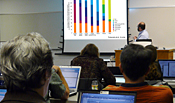You are here
CMOP welcomes National Geographic Explorer Jon Waterhouse as an Indigenous Peoples Scholar

The NSF Science and Technology Center for Coastal Margin Observation and Prediction (CMOP) and Oregon Health & Science University (OHSU) are pleased to welcome Jon Waterhouse as an Indigenous Peoples Scholar. A Native American of S’Skallam, Chippewa and Cree decent, Waterhouse seeks a global understanding of the interactions among the natural environment, people, culture and climate change, as viewed through an indigenous lens.
Expanding on his previous efforts, at CMOP Waterhouse will be creating a network at the nexus of indigenous knowledge and contemporary science that will connect people and cultures over vast distances around the globe. From the remote Amazonian Basin in South America to the Lena River in Siberia, groups who are worlds away from modern scientific labs, will collect water samples and make automated measurements of data on the natural environment, of the type that the Intergovernmental Panel on Climate Change identified as ‘missing’.
Waterhouse believes, and has seen firsthand, that by incorporating traditional native knowledge with modern science, a clearer picture of the condition of our planet emerges and doors open in science to the perspectives of countless generations of place-based people. As former executive director of the Yukon River Inter-tribal Watershed Council, Waterhouse worked across the 326,000 square mile Yukon Watershed in Alaska and Canada hand-in-hand with tribes and First Nations People, enhancing a 14-year water quality study, examining the human footprint and implementing ways to reduce its negative impacts. In his new position at CMOP and OHSU, Waterhouse is eager to engage the broad Native American community in the Pacific Northwest and indigenous communities around the world with leading edge scientific programs in coasts and estuaries and more broadly in environmental and human health.
“Small, remote populations live on the frontline of climate change and I feel that, thus far, we’ve been remiss in not inviting them into the scientific discussion,” says Waterhouse. “They are witnesses to significant environmental shifts that we in our climate-controlled, brick and mortar realities may never experience directly, but by which we are certainly being impacted. We can learn so much about historical environmental changes from place-based people and in return, western science can open up a whole new world for Native populations by sharing technology and its methods of contemporary data collection and analysis. It’s a win/win process where everyone can bring something of great value to the conversation. I sincerely applaud OHSU’s awareness for this need, and its shifting paradigm to make the connection between these two worlds happen.”
Jon Waterhouse is a National Geographic Education Fellow and Explorer. He serves on the Board of the Alaska/Sudan Medical Project. In 2010 he was one of five US citizens appointed by President Barack Obama to the 15-member Joint Public Advisory Committee under the Commission for Environmental Cooperation, advising Canada, Mexico and the United States on environmental challenges. He serves on the Advisory Board of the Arctic Alliance, is a 2012 Eco-Trust Indigenous Leadership Awardee and retired U.S. Navy Chief Petty Officer.
CMOP is a multi-institutional NSF Science and Technology Center, hosted by the Oregon Health & Science University (OHSU) through its Institute for Environmental Health (IEH). Other academic partners of CMOP include Oregon State University and University of Washington. CMOP has been recognized by the Affiliated Tribes of Northwest Indians for its collaborations with tribal organizations across the Pacific Northwest. Read more about CMOP at http://www.stccmop.org/.






